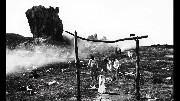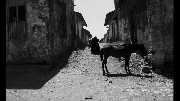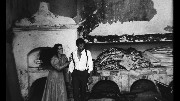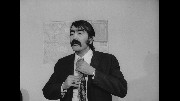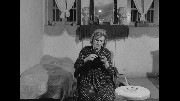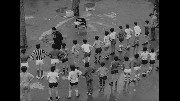Martin Scorsese’s World Cinema Project No. 3: Lucia (1968), After the Curfew (1954), Pixote (1980), Dos monjes (1934), Soleil O (1970), Downpour (1972) 6 x DVD9 and 3 x Blu-Ray Criterion Collection
on October 18th, 2021 at 05:05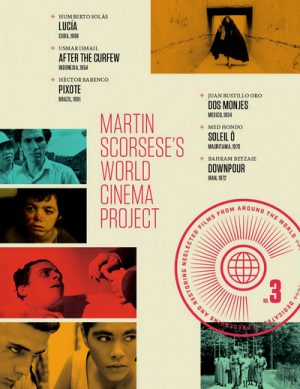
If three is enough to form a pattern, we can now anticipate that Criterion will be releasing a new volume of the World Cinema Project every 3-4 years. And if the pattern continues, each volume in the set will be more than worth the wait.
The World Cinema Project, spearheaded by Martin Scorsese's The Film Foundation, states its commitment “to preserve and present marginalized and infrequently screened films from regions generally ill equipped to preserve their own cinema history.” This mission involves extensive restoration of films whose elements exist in a perilous state as well as the distribution of such films to a wider audience, both in theaters and on home video.
These Criterion sets comprise only a portion of the films promoted by The World Cinema Project. Earlier volumes spotlighted works from Senegal, Taiwan, Turkey, Kazakhstan, The Philippines, Thailand, Morocco, and several other nations. Volume Three spans four continents, six nations, and five decades – a typically eclectic selection for this ambitious series.

Juan Bustillo Oro's Dos Monjes, from 1934, is an early example of Mexican gothic horror that ponders whether honest testimony in response to a traumatic event is possible when torrid emotions are involved. Two monks offer their recollections of murder and betrayal to an objective listener, and as their shared past is recounted twice, once from the point of view of each man, the comparisons to Akira Kurosawa’s Rashoman are inevitable; the dialogue exchanges between the monks help to articulate how pride and personal vendettas make constructing truthful histories next to impossible. The film, released early in the sound era, also employs an expressionist approach that recalls Robert Wiene’s The Cabinet of Dr. Caligari, especially in its use of close-ups.
The crown jewel of this collection, Humberto Solas's 1968 epic Lucia follows three different women named Lucia at transitional moments in Cuban history: 1895, 1932, and an unidentified year in the 1960s. While each chapter functions independently of each other, they accumulate a sense of how a generation’s actions inevitably and irrevocably lay the groundwork for the next. Whether the film is in the midst of depicting murder, tragedy, or revolution—and Lucia abounds in depictions of all three—Solas directs with a focused fury seldom seen in the annals of cinema; he constructs indelible images of beauty and rage with an intensity that’s wild-eyed but simultaneously grounded in the specificity of each era.
Less virtuoso, though no less driven by a full-throated lament for injustice, is Usmar Ismail's After the Curfew, a classic of Indonesian cinema. This 1954 melodrama tracks Iskander (A.N. Alcaff), a freedom fighter who finds coming home difficult, both psychologically and practically, in the wake of the Indonesian National Revolution. Ismail convincingly probes how colonial rule worms its way into the minds of the colonized by allowing the characters to emerge (they seem to linger in the foreground often) as embodiments of emotions that otherwise seem to remain suppressed within the country’s postcolonial milieu.
An important and successful work of the first wave of Iranian cinema, Bahram Beyzaie's Downpour, set in pre-revolutionary Iran, achieves a comparable effect through its satirical focus on the foibles of Mr. Hekmati (Parviz Fanizadeh), a newly relocated schoolteacher who struggles both to reign in his rambunctious students and connect with his neighbors. Beyzaie tacks moments of slapstick humor onto a neorealist through line that also features instances of dazzling camerawork, making it difficult to pin down the film’s style or tone.
Scorsese calls Hector Babenco's Pixote another branch on the tree of neorealism, but the likes of Vittorio De Sica and Roberto Rossellini never directed a film with such calculated brutality. This 1980 Brazilian drama mercilessly puts its eponymous 10-year-old protagonist (Fernando Ramos da Silva) through the wringer of poverty, crime, abuse, and trauma. It’s all meant to be an indictment, it seems, of Brazil’s military dictatorship, but Babenco only gestures at depicting institutional corruption beyond the most obvious melodramatic swipes at police making murders appear like suicides. At times, a teacher or a counselor appear empathetic toward Pixote and his ilk, but what’s Babenco really offering here aside from an overwrought glimpse behind the curtain of absolutely inhuman pain and suffering? The end result is less an aching cry for humanity than a torture contraption for willing, masochistic audiences.
Med Hondo's Soleil O opts for a logic-oriented critique of seemingly immovable systemic corruption. The 1970 Mauritanian film proves remarkably complex despite its straightforward story concerning an unnamed African immigrant (Robert Liensol) trying to find employment, kinship, and stability in France. He’s turned away from jobs that are seemingly available, he engages in prolonged conversations with a white intellectual who uses logic to disguise his racism, and he endures hysterical local propaganda claiming there’s a “black invasion,” all while the local travel agency advertises a “Vacation in black Africa.” Hondo burrows into the madness wrought by systemic racism through various techniques, ranging from animation to interior monologue to montage sequences. Like Dijbril Diop Mambety’s subsequent Touki Bouki, Soleil O is a tour de force of intellectual and cinematic daring.
3xBD59, 6xDVD9 | 1080p AVC, NTSC | 694 min
Language: Spanish, Indonesian, Portuguese, French, Persian
Subtitles: English
Genre: Comedy, Crime, Drama, Horror, Mystery, Romance
Extras:
Each film gets an introduction from Martin Scorsese and an accompanying interview with either a historian, actor, or filmmaker. Scorsese’s intros each clock in at less than three minutes and provide key details about a film’s production and restoration efforts. The interviews that accompany each film are much weightier. Film scholar Charles Ramirez Berg explains how the coming of sound saved Mexican cinema, with Dos Monjes playing a key role in that momentous event. Journalist J.B. Kristano discusses the difficulties of studying Indonesian cinema when there’s hardly a single book on its history. A 2018 interview with Med Hondo delves into the “nonexistent” state of African cinema when he made Soleil O. Bahram Beyzaie explains how Downpour was a response to Iranian cinema during the early 1970s, and Hector Babenco discusses his aversion to academia and how watching films by Yasujiro Ozu and Ingmar Bergman formed his cinematic identity. Finally, instead of an accompanying interview for Lucia, Criterion has included Humberto & Lucia, a 2020 documentary short by Carlos Barba Salva about the film’s production and reception.
MSWCP3.BD1.Lucia.After.Curfew.U.part01.rar
MSWCP3.BD1.Lucia.After.Curfew.U.part02.rar
MSWCP3.BD1.Lucia.After.Curfew.U.part03.rar
MSWCP3.BD1.Lucia.After.Curfew.U.part04.rar
MSWCP3.BD1.Lucia.After.Curfew.U.part05.rar
MSWCP3.BD1.Lucia.After.Curfew.U.part06.rar
MSWCP3.BD1.Lucia.After.Curfew.U.part07.rar
MSWCP3.BD1.Lucia.After.Curfew.U.part08.rar
MSWCP3.BD1.Lucia.After.Curfew.U.part09.rar
MSWCP3.BD1.Lucia.After.Curfew.U.part10.rar
MSWCP3.BD1.Lucia.After.Curfew.U.part11.rar
MSWCP3.BD2.Pixote.Dos.Monjes.U.part01.rar
MSWCP3.BD2.Pixote.Dos.Monjes.U.part02.rar
MSWCP3.BD2.Pixote.Dos.Monjes.U.part03.rar
MSWCP3.BD2.Pixote.Dos.Monjes.U.part04.rar
MSWCP3.BD2.Pixote.Dos.Monjes.U.part05.rar
MSWCP3.BD2.Pixote.Dos.Monjes.U.part06.rar
MSWCP3.BD2.Pixote.Dos.Monjes.U.part07.rar
MSWCP3.BD2.Pixote.Dos.Monjes.U.part08.rar
MSWCP3.BD2.Pixote.Dos.Monjes.U.part09.rar
MSWCP3.BD2.Pixote.Dos.Monjes.U.part10.rar
MSWCP3.BD2.Pixote.Dos.Monjes.U.part11.rar
MSWCP3.BD3.Soleil.O.Downpour.U.part01.rar
MSWCP3.BD3.Soleil.O.Downpour.U.part02.rar
MSWCP3.BD3.Soleil.O.Downpour.U.part03.rar
MSWCP3.BD3.Soleil.O.Downpour.U.part04.rar
MSWCP3.BD3.Soleil.O.Downpour.U.part05.rar
MSWCP3.BD3.Soleil.O.Downpour.U.part06.rar
MSWCP3.BD3.Soleil.O.Downpour.U.part07.rar
MSWCP3.BD3.Soleil.O.Downpour.U.part08.rar
MSWCP3.BD3.Soleil.O.Downpour.U.part09.rar
MSWCP3.BD3.Soleil.O.Downpour.U.part10.rar
MSWCP3.DVD1.Lucia.U.part1.rar
MSWCP3.DVD1.Lucia.U.part2.rar
MSWCP3.DVD2.After.Curfew.U.part1.rar
MSWCP3.DVD2.After.Curfew.U.part2.rar
MSWCP3.DVD3.Pixote.U.part1.rar
MSWCP3.DVD3.Pixote.U.part2.rar
MSWCP3.DVD4.Dos.monjes.U.part1.rar
MSWCP3.DVD4.Dos.monjes.U.part2.rar
MSWCP3.DVD5.Soleil.O.U.part1.rar
MSWCP3.DVD5.Soleil.O.U.part2.rar
MSWCP3.DVD6.Downpour.U.part1.rar
MSWCP3.DVD6.Downpour.U.part2.rar


